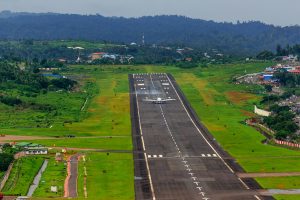Airport concessionaires play a crucial role in the travel industry, providing a wide range of products and services to enhance the overall airport experience for travelers. From food and beverage options to retail stores and duty-free shops, airport concessionaires contribute to the convenience and enjoyment of passengers during their journey.
These businesses also generate significant revenue for airports, making them an integral part of the aviation industry.
This article is related with my following research articles that you can visit:
Introduction to Airport Concessionaires
Airport concessionaires are businesses that operate within airports and provide various goods and services to travelers. These businesses are typically contracted by the airport authorities to operate in designated spaces within the terminal buildings. They offer a diverse range of products and services, catering to the needs and preferences of passengers.
Examples of airport concessionaires include food and beverage outlets such as restaurants, cafes, and bars. Retail concessionaires offer a variety of products, including clothing, accessories, electronics, and souvenirs. Duty-free concessionaires provide tax-free shopping opportunities for international travelers.
Other types of concessionaires may include car rental companies, currency exchange services, and spa facilities.
The Role of Airport Concessionaires in the Travel Industry
Airport concessionaires play a vital role in enhancing the overall travel experience for passengers. They provide convenient options for dining, shopping, and relaxation, allowing travelers to make the most of their time at the airport.
Whether it’s grabbing a quick bite to eat before a flight or browsing through duty-free shops for last-minute purchases, airport concessionaires offer convenience and entertainment.
Moreover, airport concessionaires contribute significantly to the revenue generation of airports. The fees paid by these businesses for operating within the airport premises contribute to the overall financial sustainability of airports.
This revenue helps fund infrastructure development, maintenance, and other operational expenses. Without the income generated by airport concessionaires, airports would have to rely solely on airline fees and government funding, which may not be sufficient to meet their financial needs.
Types of Airport Concessionaires and Their Offerings
Airport concessionaires can be categorized into different types based on the products and services they offer. Some of the common types of airport concessionaires include:
- Food and beverage concessionaires: These businesses operate restaurants, cafes, bars, and fast-food outlets within airports. They provide a variety of dining options to cater to different tastes and dietary preferences. From fine dining establishments to grab-and-go counters, food and beverage concessionaires ensure that passengers have access to a wide range of culinary choices.
- Retail concessionaires: Retail concessionaires operate stores that sell a variety of products, including clothing, accessories, electronics, books, and souvenirs. These stores offer a convenient shopping experience for travelers, allowing them to purchase essential items or indulge in some retail therapy before their flights.
- Duty-free concessionaires: Duty-free shops are a popular feature in many airports, especially for international travelers. These shops offer tax-free shopping opportunities for passengers, allowing them to purchase a wide range of products such as cosmetics, perfumes, alcohol, tobacco, and luxury goods at discounted prices.
- Other types of concessionaires: In addition to food and beverage, retail, and duty-free concessionaires, there are other businesses that operate within airports. These may include car rental companies, currency exchange services, spa facilities, and even entertainment venues such as cinemas or gaming zones.
Challenges Faced by Airport Concessionaires
While airport concessionaires play a crucial role in the travel industry, they also face several challenges in their operations. Some of the key challenges include:
- High operating costs: Operating within an airport can be expensive for concessionaires. They often have to pay high rents for prime locations within the terminal buildings. Additionally, they may incur significant costs for staffing, inventory management, and marketing. These high operating costs can put pressure on the profitability of concessionaire businesses.
- Limited space and competition for prime locations: Airports have limited space available for concessionaires, and there is often fierce competition for prime locations within the terminal buildings. Concessionaires need to secure the best possible locations to attract customers and maximize their sales. However, securing these prime locations can be challenging, especially for new or smaller businesses.
- Regulatory challenges: Airport concessionaires need to comply with various regulations and standards set by airport authorities and regulatory bodies. These regulations may include health and safety standards, security requirements, and licensing procedures. Complying with these regulations can be time-consuming and costly for concessionaires.
The Impact of COVID-19 on Airport Concessionaires
The COVID-19 pandemic has had a significant impact on the aviation industry as a whole, and airport concessionaires have been particularly affected. With travel restrictions, lockdowns, and reduced passenger numbers, airport concessionaires have experienced a sharp decline in business.
Many airport concessionaires had to temporarily close their operations during the height of the pandemic. Even as airports started to reopen, passenger numbers remained significantly lower than pre-pandemic levels, resulting in reduced footfall and sales for concessionaires.
To adapt to the new normal, airport concessionaires have had to implement various strategies. These include implementing enhanced health and safety measures, such as increased cleaning and sanitization, promoting contactless transactions, and ensuring social distancing within their premises.
Some concessionaires have also expanded their online presence, offering delivery or pickup services to cater to customers who prefer to avoid crowded spaces.
Strategies for Success in the Airport Concession Business
Despite the challenges faced by airport concessionaires, there are strategies that can help them succeed in this competitive industry. Some key strategies include:
- Importance of market research and understanding customer needs: Airport concessionaires need to conduct thorough market research to understand the preferences and needs of their target customers. This includes analyzing passenger demographics, travel patterns, and consumer trends. By understanding their customers, concessionaires can tailor their offerings to meet their specific needs and preferences.
- Developing a strong brand and unique offerings: In a crowded marketplace, it is essential for airport concessionaires to differentiate themselves from their competitors. This can be achieved by developing a strong brand identity and offering unique products or services that are not readily available elsewhere. By creating a distinct brand and offering something different, concessionaires can attract customers and build a loyal customer base.
- Building relationships with airport authorities and vendors: Building strong relationships with airport authorities and vendors is crucial for the success of airport concessionaires. These relationships can help concessionaires secure prime locations within the airport, negotiate favorable lease terms, and access a wide range of products and services. By collaborating with airport authorities and vendors, concessionaires can create mutually beneficial partnerships that contribute to their success.
The Future of Airport Concessionaires
The future of airport concessionaires is likely to be shaped by various trends and innovations in the industry. Some key trends include:
- Technology integration: Technology is playing an increasingly important role in the airport concession business. From mobile ordering and payment systems to digital signage and personalized marketing, technology is being used to enhance the customer experience and streamline operations. Concessionaires that embrace technology and leverage its potential are likely to have a competitive advantage in the future.
- Sustainability and wellness: As consumers become more conscious of their environmental impact and prioritize their health and well-being, airport concessionaires need to adapt to these changing preferences. This may include offering sustainable and eco-friendly products, providing healthy food options, and incorporating wellness services into their offerings.
- Personalization and customization: Personalization is becoming a key trend in the travel industry, and airport concessionaires can leverage this trend to enhance the customer experience. By offering personalized recommendations, tailored promotions, and customized products or services, concessionaires can create a more personalized and memorable experience for their customers.
Best Practices for Airport Concessionaires
To succeed in the airport concession business, there are several best practices that concessionaires should follow. These include:
- Providing excellent customer service: Customer service is crucial in the airport concession business. Concessionaires should strive to provide exceptional service to their customers, ensuring that their needs are met and their expectations are exceeded. This includes training staff to be friendly, knowledgeable, and responsive to customer inquiries and concerns.
- Maintaining high standards of cleanliness and hygiene: Cleanliness and hygiene are of utmost importance in the airport environment, especially in light of the COVID-19 pandemic. Concessionaires should implement rigorous cleaning and sanitization protocols to ensure the safety of their customers and staff. Regular inspections and audits should be conducted to maintain high standards of cleanliness.
- Offering a diverse range of products and services: Airport concessionaires should aim to offer a diverse range of products and services to cater to the needs and preferences of different customers. This includes providing options for different dietary requirements, offering a variety of price points, and ensuring that there is something for everyone.
The Importance of Customer Service in Airport Concessions
Customer service plays a crucial role in the success of airport concessionaires. The airport experience can be stressful for travelers, and excellent customer service can help alleviate some of that stress and enhance the overall experience.
Concessionaires should train their staff to be friendly, approachable, and knowledgeable about their products and services. Staff should be able to provide recommendations, answer customer inquiries, and resolve any issues or concerns promptly and efficiently.
Exceptional customer service can also lead to repeat business and positive word-of-mouth recommendations. Satisfied customers are more likely to return to the same concessionaire in the future and recommend it to others, contributing to the long-term success of the business.
Conclusion: The Exciting World of Airport Concessionaires
In conclusion, airport concessionaires play a vital role in the travel industry, providing a wide range of products and services to enhance the overall airport experience for travelers. From food and beverage options to retail stores and duty-free shops, airport concessionaires contribute to the convenience and enjoyment of passengers during their journey.
Despite the challenges they face, airport concessionaires have the opportunity to succeed by understanding customer needs, developing a strong brand, and building relationships with airport authorities and vendors.
By embracing trends and innovations in the industry, such as technology integration and sustainability, concessionaires can position themselves for future growth and expansion.
As travelers, we should appreciate the efforts of airport concessionaires in making our journeys more enjoyable. The next time you find yourself at an airport, take the time to explore the world of airport concessions and discover the diverse range of products and services they have to offer.


